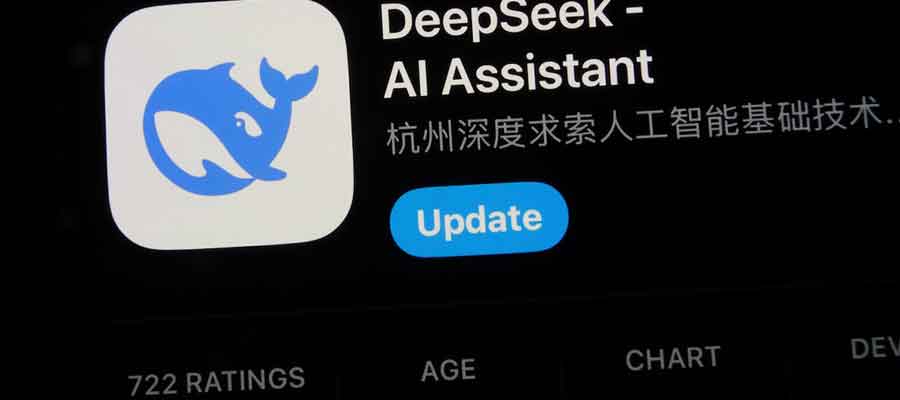



![]() Point(s) of Contact
Point(s) of Contact
Pamela Hamilton / FSO

843.327.3273
pamela@appliedsecurityknowledge.com
Richard Carmichael / ITPSO
678.221.7834
rcarmichael@laochservices.com

DoD Hotline
dodig.mil/hotline / 800.424.9098
SOURCE: ZDNET by Radhika Rajkumar – February 18, 2025

Just weeks into its new-found fame, Chinese AI startup DeepSeek is moving at breakneck speed, toppling competitors and sparking axis-tilting conversations about the virtues of open-source software.
However, numerous security concerns have surfaced about the company, prompting private and government organizations to ban the use of DeepSeek. Here's what you need to know.
What is DeepSeek?
Founded by Liang Wenfeng in May 2023 (and thus not even two years old), the Chinese startup has challenged established AI companies with its open-source approach. According to Forbes, DeepSeek's edge may lie in the fact that it is funded only by High-Flyer, a hedge fund also run by Wenfeng, which gives the company a funding model that supports fast growth and research.
SOURCE: SecurityWeek by Associated Press – February 6, 2025

A bipartisan duo in the the U.S. House is proposing legislation to ban the Chinese artificial intelligence app DeepSeek from federal devices, similar to the policy already in place for the popular social media platform TikTok.
Reps. Josh Gottheimer, D-N.J., and Darin LaHood, R-Ill., on Thursday introduced the "No DeepSeek on Government Devices Act," which would ban federal employees from using the Chinese AI app on government-owned electronics. They cited the Chinese government's ability to use the app for surveillance and misinformation as reasons to keep it away from federal networks.
"The Chinese Communist Party has made it abundantly clear that it will exploit any tool at its disposal to undermine our national security, spew harmful disinformation, and collect data on Americans," Gottheimer said in a statement. "We simply can't risk the CCP infiltrating the devices of our government officials and jeopardizing our national security."
SOURCE: Reuters by Reuters – March 7, 2025

The Deepseek logo is seen in this illustration taken Jan. 27, 2025. REUTERS/Dado Ruvic/Illustration/File Photo Purchase Licensing Rights
WASHINGTON, March 7 (Reuters) - The Trump administration is weighing a ban on Chinese AI chatbot DeepSeek from U.S. government devices over national-security concerns, a person familiar with the matter said on Friday.
U.S. officials are worried about DeepSeek's handling of user data, which the company says it stores in servers located in China, according to the Wall Street Journal, which first reported the news.
Administration officials are also considering banning the chatbot from app stores and putting limits on how U.S.-based cloud service providers could offer DeepSeek's AI models to their customers, the Journal said, adding that those discussions are still at an early stage.
Administration officials are also considering banning the chatbot from app stores and putting limits on how U.S.-based cloud service providers could offer DeepSeek's AI models to their customers, the Journal said, adding that those discussions are still at an early stage.
SOURCE: US Department of Justice Press Release – February 4, 2025

Minh Quang Pham, also known as "Amim", 41, was sentenced today to 44 years in prison and a lifetime of supervised release for attempted suicide bombing in alliance with al-Qaeda in the Arabian Peninsula (AQAP), a designated foreign terrorist organization.
"The defendant was sentenced for an attempt to commit an act of terrorism and plotting a suicide bombing on behalf of AQAP," said Devin DeBacker, head of the Justice Department's National Security Division. "The Justice Department will not rest in seeking justice for acts of terrorism and will continue to thwart any attempt to jeopardize global security."
"Pham coordinated with known terrorist Anwar al-Aulaqi on a plot to conduct a suicide bombing at Heathrow International Airport which could have killed or injured many people, but fortunately that plan was stopped," said Assistant Director David J. Scott of the FBI's Counterterrorism Division. "Pham also tried to recruit others to commit acts of terrorism. The FBI will work with our partners to hold accountable those who align themselves with terrorist organizations and attempt to carry out acts of violence."
SOURCE: ClearanceJobs by Jillian Hamilton - Feb 6, 2025

When it comes to national security, trust isn't just a virtue—it's a requirement. With nearly 4.5 million Americans holding security clearances, the federal government has to be sure that those handling classified information are up to the task. That's where Peraton comes into the picture with their latest win.
The company just scored a major recompete contract, securing its role as the sole contractor responsible for conducting background investigations for a critical federal customer. If you're looking to team up as a subcontractor or find a job in background investigations, Peraton would be your place to start.
Background Investigations Are Key to a Secure Workforce
Background investigations are the backbone of a secure workforce. It's a component in the application process that can take up a lot of time. Efficiency and accuracy are crucial – for the sanity of the applicant and the safety of national security. Whether it's the intelligence community, defense sector, or agencies like the CDC, making the right hiring decisions depends on access to thorough, accurate, and timely vetting. Peraton's work ensures that only the most qualified, trustworthy individuals gain access to sensitive government roles.
SOURCE: Defense One by Patrick Tucker – February 6, 2025

Maxar 'AFTER" satellite imagery of the reported attack on a Russian Ropucha-class landing ship at the eastern Crimean port of Feodosia. Satellite image (c) 2023 Maxar Technologies
Google has discarded its self-imposed ban on using AI in weapons, a step that simultaneously drew praise and criticism, marked a new entrant in a hot field, and underscored how the Pentagon—not any single company—must act as the primary regulator on how the U.S. military uses AI in combat.
On Tuesday, Google defended its decision to strip its AI-ethics principles of a 2018 prohibition against using AI in ways that might cause harm.
"There's a global competition taking place for AI leadership within an increasingly complex geopolitical landscape. We believe democracies should lead in AI development, guided by core values like freedom, equality, and respect for human rights," it reads.
The move is a long-overdue correction to an overcorrection, one person familiar with the company's decision-making process told Defense One.
SOURCE: SC Media by Paul Wagenseil – January 25, 2025

Identity security will see several ongoing long-term trends continue over the next few years. These include greater adoption of phishing-resistant authentication; greater acceptance of passkeys and other passwordless protocols; further migration to cloud-native identity-management platforms; and accelerating consolidation of formerly siloed identity-management tools such as IAM, PAM and IGA.
The continuing adoption of zero-trust frameworks will cement identity's place as foremost among information-security protections. Correspondingly, even more attackers will target identity as their initial means of entry.
Newer concepts in identity may be further developed, such as identity threat detection and response and universal standards for identity security. Of course, we'll also see much more in the interface between identity security and artificial intelligence, although those developments are harder to predict.
SOURCE: CDSE
In this game, you will be asked to find the security vulnerabilities in two scenarios. In each scenario, you will see two images with different vulnerabilities in each of them. Use your mouse to click on each of the vulnerabilities you see in the two images. You will also have the opportunity to identify vulnerabilities in a third bonus scenario.
These workspaces are in a contractor facility cleared at the TOP SECRET level with TOP SECRET safeguarding. None of the workspaces in these scenarios are inside a Special Compartmented Information Facility (SCIF) or an open storage area that is authorized to openly store classified information.
SOURCE: CDSE

Teixeira enlisted in the U.S. Air National Guard (USANG) in September 2019. He served with the 102nd Intelligence Wing at Otis USANG Base in Massachusetts as a Cyber Defense Operations Journeyman. Teixeira's primary responsibility was maintaining and troubleshooting the classified workstations of other members of the wing. To perform his job, Teixeira was granted a Top Secret/Sensitive Compartmented Information (TS/SCI) security clearance in 2021. Beginning in or around January 2022, Teixeira unlawfully retained and transmitted National Defense Information (NDI) classified as "TOP SECRET" or "SECRET" and/or Sensitive Compartmented Information onto the social media platform Discord to persons not authorized to receive such information.